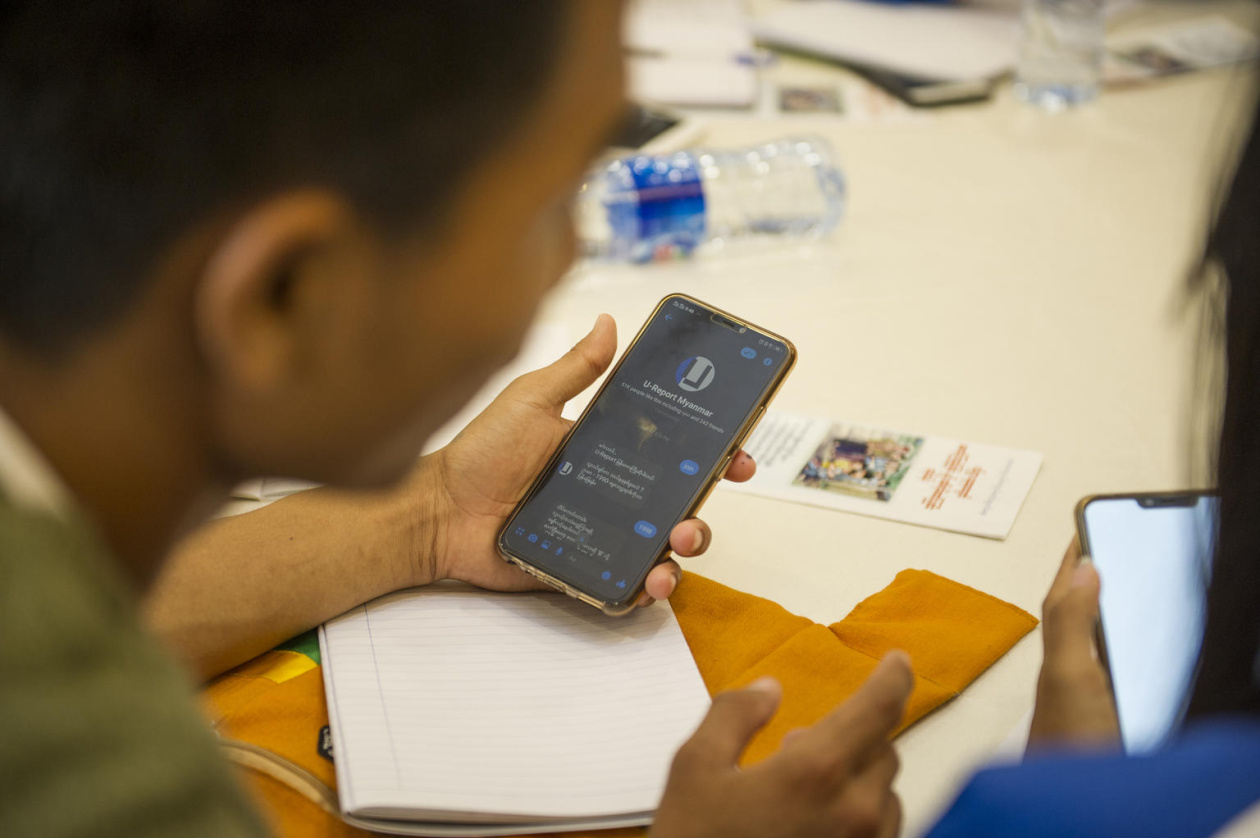 © UNICEF
© UNICEF
U-Report: the power to make a difference at your fingertips
Sist oppdatert Tirsdag, 29/09/2020
From Ukraine to Mozambique, U-Report, UNICEF’s free social messaging tool, is giving young people worldwide a way to make themselves heard and reach decision-makers.
With help from the EU, this can translate into positive changes in their lives.
All over the world, young people like you are using their fingertips to make a difference where they live. But it’s not through Twitter, Facebook, Snapchat or Instagram. We’re talking about U-Report.
Grab your phone and follow U-Report Global on Facebook Messenger. It’s a free social messaging tool created by UNICEF. It’s easy to use, confidential and provides real-time information and feedback.
So, what’s in it for you?
You get to have your say about issues that affect your neighbourhood. You can tell leaders in your community what worries or concerns you, what keeps you awake at night, or what the changes you want to see in your area. You can get up-to-date information on issues like health, sanitation, jobs, HIV/Aids, coronavirus, or other things that are important to you.
NGOs, civil society, government officials and elected leaders can see the information posted on the U-Report site to understand what you need and make changes.
There are already more than 11 million U-reporters in 67 countries, from the Dominican Republic to Indonesia. So what are you waiting for?
Shaking up Ukraine
To take things from the digital into the real world, U-Report holds events that bring U-reporters together.
‘From Dreams to Action’ is an annual forum for those who regularly participate in U-Report polls. The event allows young people like you to meet up and share ideas on how to become a force for good.
In October 2018, it was held in Sviatohirsk, a town in the conflict-affected eastern part of Ukraine. Seventy reporters in 18 teams from all over Ukraine attended the event where they learnt skills to develop and implement their own projects, something you don’t always get at school.
Here’s what a team member of the StudySpace Urban Library – Mariupol project had to say about it: ‘Our expectations are already coming true. We have gained really interesting knowledge from the panels and workshops, on youth participation in civic activities, and on how to make youth participation effective.’ Their project was about creating places to discuss and develop ideas for improving life in their city.
Five teams received funding to make their dreams a reality. These included encouraging young people to go on expeditions to lesser-known places in Ukraine, 3D-modelling courses, leadership skills training, and a project to set up a waste-management system in a village near the conflict zone.
Using U-Report, each team encouraged between 100 to 500 of their friends to get on board with their projects.
UNICEF and EU teaming up for youth
Ukrainian schoolchildren living in areas hit by conflict face problems like a lack of hygiene supplies, privacy during menstruation, and access to toilets.
Children lack access to information about sexual health and menstrual hygiene – there is just not enough discussion about these topics. Some girls face bullying or harassment from other girls about menstruation.
This was revealed thanks to U-Report’s polls conducted in the Donetsk and Luhansk areas, in which 9 000 young people took part. Children were asked about topics like online safety and violence prevention, climate change, conflict resolution, civic engagement, healthcare, and education.
They were participating as part of a UNICEF and EU-funded project to help young people in that part of Europe. Thanks to the teamwork in these organisations, campaigns on female health were launched, hygiene packs were distributed and sanitation facilities in schools were improved.
Heroes in Mozambique
‘I feel like a hero. Now I can make conscious choices. I help girls who are going through the same situation that I did. I share my story and guide their choices.’
These are the words of Filomena, a 22-year-old Mozambican woman who is helping young girls overcome difficulties like those she faced while growing up. In Mozambique, U-Report is called SMS Biz.
Filomena is one of many mentors trained by the SMS Biz programme to help her peers. She responds to their texts about issues like child marriage, violence, HIV and adolescent health.
Over 291 000 kids in this country have linked up to the service. It gives girls and boys answers to questions they often don’t feel comfortable asking adults, like what their rights are, about relationships, sexuality and HIV and Aids.
Thanks to teamwork between the Spotlight Initiative and SMS Biz, counselling hubs are being set up. Here, young women are trained as mentors and taught how to respond to queries that come in via SMS, which means more people can access help faster.
The hub being set up in Mozambique’s Nampula province is training 20 mentors who between them can respond to up to 30 000 questions a month.
It’s important to have access to information like this. The Spotlight Initiative says that about 46 % of girls in Mozambique aged 15 to 19 are either pregnant or already have children.
A lack of access to education, along with gender-based violence, is preventing many from realising their potential.
So why not help realise some potential and get those fingertips working!